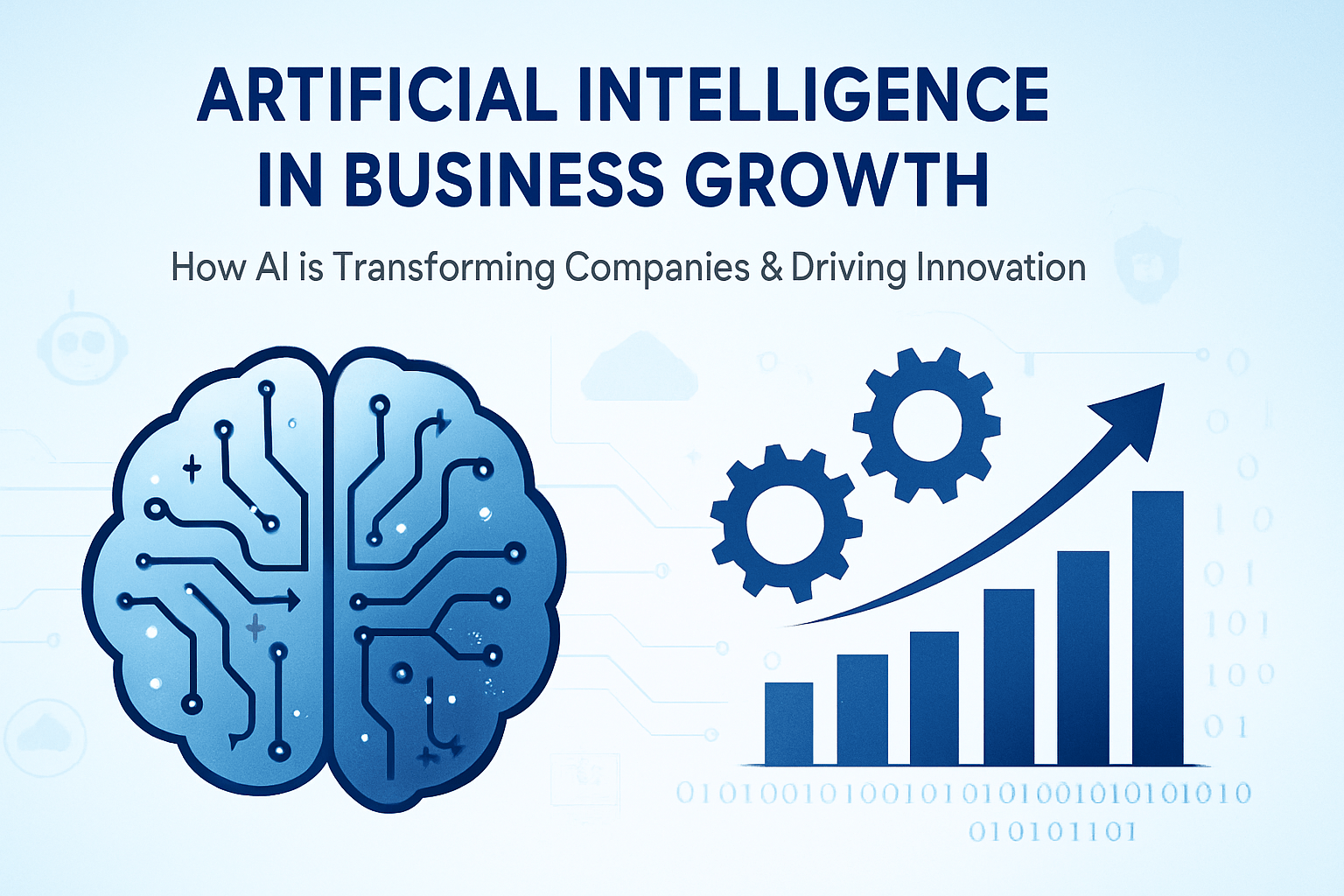Artificial Intelligence in Business Growth

Artificial Intelligence (AI) is revolutionizing the business landscape, transforming how companies operate, make decisions, and engage with customers. From startups to established giants, businesses of all sizes are leveraging AI to stay competitive, drive innovation, and enhance efficiency.
Understanding AI in Business
- Basics of AI: AI is essentially a technology that enables machines to mimic human intelligence. It involves creating algorithms that allow systems to learn from data, make decisions, and solve problems. Think of AI as a super-smart assistant that can analyze information, recognize patterns, and predict outcomes without getting tired or needing breaks.
- Evolution of AI: AI has evolved from being a tool used mainly by large corporations with deep pockets to becoming more accessible to businesses of all sizes. Today, advancements in technology have made AI tools available to everyone, from small startups to large enterprises, making it a crucial component of modern business strategies.
Impact of AI on Business Growth
- Driving Innovation and Competitive Advantage: AI is a powerful driver of innovation. It helps businesses develop new products, services, and processes that can give them a competitive edge. For example, AI can analyze market trends and customer behavior to uncover new opportunities and create innovative solutions that set companies apart from their competitors.
- Increasing Efficiency and Productivity: One of AI’s most significant benefits is its ability to enhance productivity. AI can automate repetitive tasks, analyze large datasets quickly, and provide insights that would be impossible for humans to gather manually. This allows businesses to focus on strategic activities and innovation while AI handles the routine work.
- Expanding Business Opportunities: AI opens up new avenues for growth. Through predictive analytics and personalized marketing, businesses can tap into previously unexplored markets and tailor their strategies to meet specific customer needs. AI acts like a treasure map, guiding businesses to new opportunities and helping them navigate the evolving market landscape.
Applications of AI in Business Operations
- AI-powered Chatbots and Virtual Assistants: AI-driven chatbots and virtual assistants have become a staple in customer service. They handle inquiries, provide support, and resolve issues without human intervention. This not only improves customer service by providing instant responses but also reduces the burden on human staff.
- Optimizing Supply Chain Management: AI plays a crucial role in managing supply chains efficiently. It can predict demand, optimize inventory levels, and streamline logistics. By analyzing data in real-time, AI helps businesses manage their supply chains more effectively, reducing costs and improving product availability.
- Enhancing Cybersecurity: AI enhances cybersecurity by detecting anomalies, identifying potential threats, and predicting cyber-attacks. It acts as a digital bodyguard, safeguarding businesses against the ever-evolving landscape of cyber threats and ensuring that sensitive information remains protected.
Enhancing Customer Experience through AI
- Personalized Customer Interactions: AI allows businesses to create highly personalized customer experiences. By analyzing data on customer preferences and behaviors, AI can offer tailored recommendations, customized offers, and proactive service. This makes customers feel valued and understood, leading to increased satisfaction and loyalty.
- Intelligent Recommendation Systems: AI-powered recommendation systems, like those used by streaming services such as Netflix, analyze user data to suggest products, movies, or services that align with individual preferences. This level of personalization enhances the user experience and drives engagement.
- Automated Customer Support: Automated customer support systems powered by AI can handle a range of tasks, from answering common questions to resolving issues. This reduces wait times for customers and improves overall service efficiency.
Overcoming Challenges in Implementing AI
- Data Privacy and Ethical Considerations: AI raises important issues around data privacy and ethics. Businesses must ensure that they handle customer data responsibly, comply with privacy regulations, and implement ethical guidelines to avoid bias and discrimination. Transparent algorithms and strict data protection measures are essential.
- Skills Gap and Workforce Training: Implementing AI requires a workforce skilled in new technologies. There is a noticeable skills gap in the market, so businesses need to invest in training and upskilling their employees. Fostering a culture of continuous learning will help organizations adapt to AI advancements.
- Integration with Existing Systems: Integrating AI into existing systems can be challenging, especially with legacy technology. It requires careful planning, collaboration between IT and business teams, and often, a phased approach to avoid disrupting current operations.
Future Outlook: AI as a Catalyst for Business Growth
- Emerging Trends in AI for Business: The future of AI is bright, with emerging trends such as natural language processing, computer vision, and reinforcement learning set to further transform business operations. These advancements will enable businesses to enhance customer experiences, automate complex tasks, and explore new growth opportunities.
- Potential Disruptions and Opportunities: AI has the potential to disrupt traditional business models and create new markets. Early adopters of AI will gain a competitive advantage, leveraging AI to meet evolving customer demands and create unique value propositions.
- Strategies for Harnessing the Power of AI: To maximize AI’s benefits, businesses should develop a clear strategy, focusing on areas where AI can have the most significant impact. Collaborating with AI experts and maintaining a culture of experimentation and adaptability will help organizations harness AI effectively for long-term growth.
Conclusion
AI is more than just a technological trend; it’s a transformative force that can drive significant growth and innovation. By leveraging AI, businesses can improve customer experiences, streamline operations, and unlock valuable insights. Addressing challenges such as data privacy, skills gaps, and system integration is crucial for successful AI adoption. With a strategic approach and a forward-thinking mindset, businesses can harness the full potential of AI and position themselves for future success.
